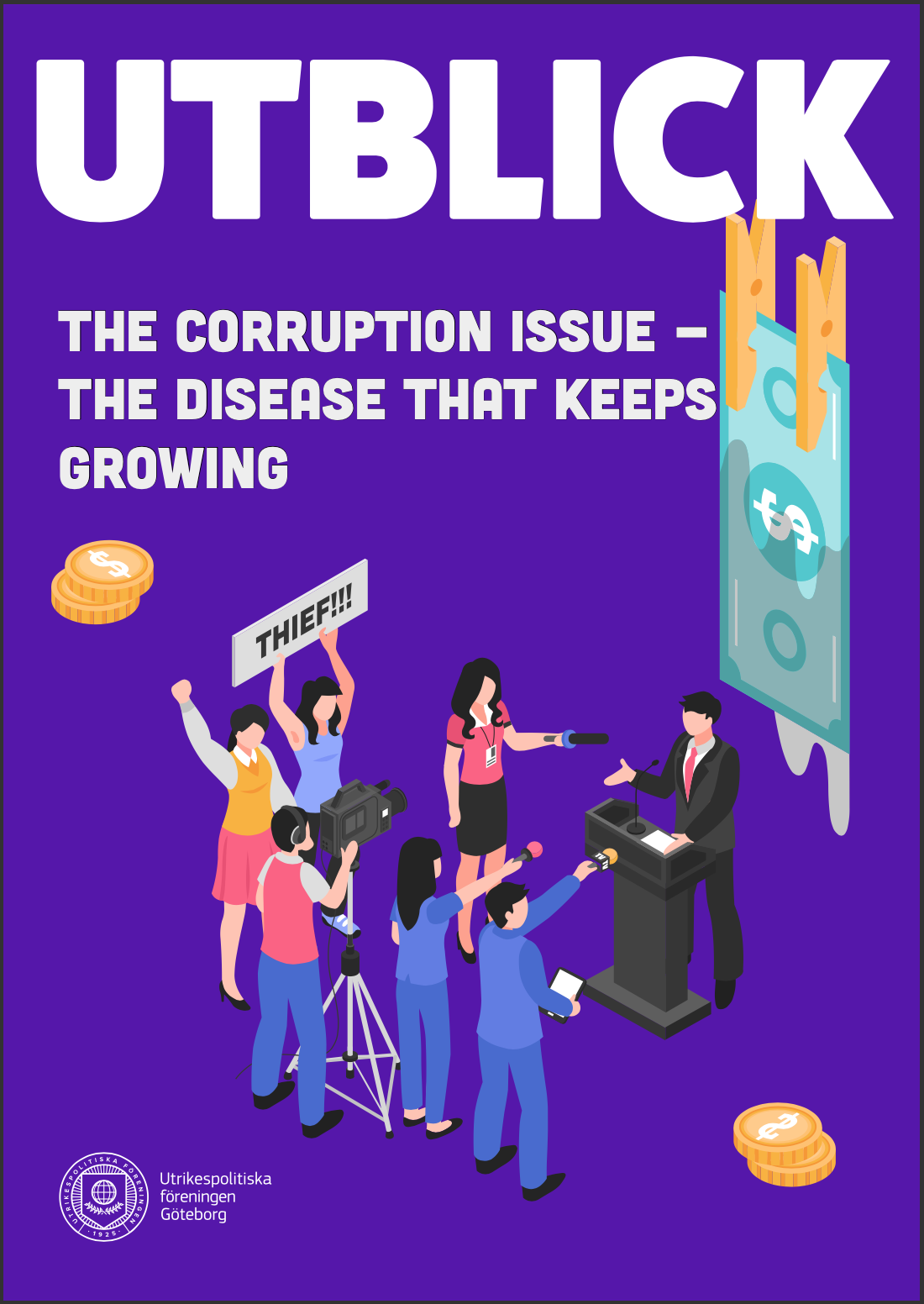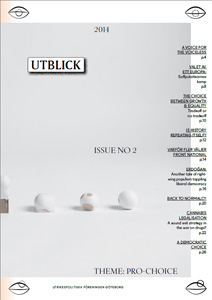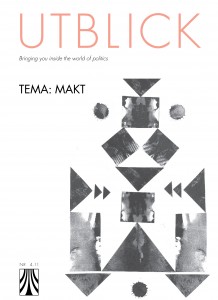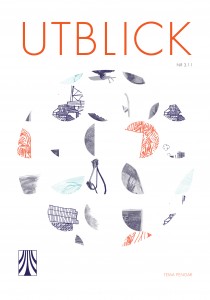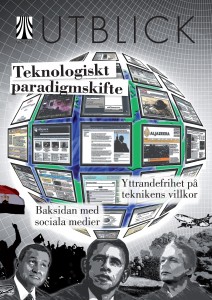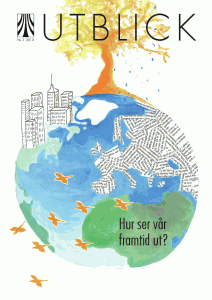The Corruption Issue – The disease that keeps growing
In this issue we offer you six different articles that zoom into different aspects of the very difficult and large question; is corruption a disease? and how do we deal with it? Apart from that, we also have a reading list for those of you who want to curl up with a good book as the days grow darker and colder, and a featured article concerning the future of US environmental politics. This is also my first issue of Utblick as the new Editor-in-chief, as well as for the rest of this year’s staff members.
We hope that you find our new issue informative, interesting and hopefully empowering rather than discouraging.
Whose Laughing Now?
The decade finally got to an end but not without some major plot twists! The fast and deep connections forged by globalization, now more evident than ever, have put into question old concepts and assumptions of global democracy, governance and political institutions all over the world. As our protagonist in the cover, part villain part victim, civil society has engaged in nervous laughter as it faces brand new 21st century challenges while still trapped in the ways of the past.

Patricia Da Matta
In this issue, we address some of the contradictions the decade has brought to the global agenda, from the threat of climate change to the rise of nationalist discourse; from the precarious of labour in the Gig economy to the transformation of journalism in an ever-connected society. We’ve also included an exclusive interview with Russian Ambassador to Sweden, which might help us clear the picture whether the dynamics of the post-cold war world still apply for current foreign diplomacy.
Whither Europe?
The European Parliament Elections raise concerns in every aspect of life in Europe. How will the election impact feminist movements? What is the role of religion in the European elections and how do parties mobilize anti-Islamic rhetoric to attract voters? How can the youth in Europe be mobilized to participate in the election and increase turnout? These are some of the key questions which will be discussed by various articles in this issue.
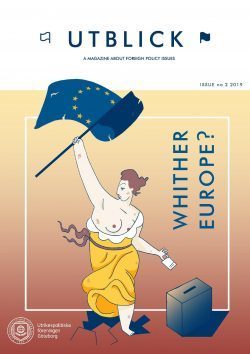 Other articles look at the role of democracy in the European Union and how a higher turnout can increase the legitimacy of this polity. You will also read about how Swedish parties in the European parliament position themselves in relation to climate change, migration, and how they envision the future of Europe. The issue further covers articles on how recent events, such as Brexit and the rise of right wing parties, would impact the upcoming European parliament elections and shape the future of the union.
Other articles look at the role of democracy in the European Union and how a higher turnout can increase the legitimacy of this polity. You will also read about how Swedish parties in the European parliament position themselves in relation to climate change, migration, and how they envision the future of Europe. The issue further covers articles on how recent events, such as Brexit and the rise of right wing parties, would impact the upcoming European parliament elections and shape the future of the union.
We hope that this issue will serve as an encouragement to take more youth to the voting booths and engage them.
Utblick_nr 2/2019
Turmoil Under Heaven
This issue is dedicated to the largest member of the aforementioned constellation, China, and its role in world order, its civil society, its history and future. You will get a micro- and macro perspective on China; from children and women in rural households and civil society activists in the Tibetan highlands, to the consequences of revised waste management policies and the situation of Uyghurs in Xinjiang Province.
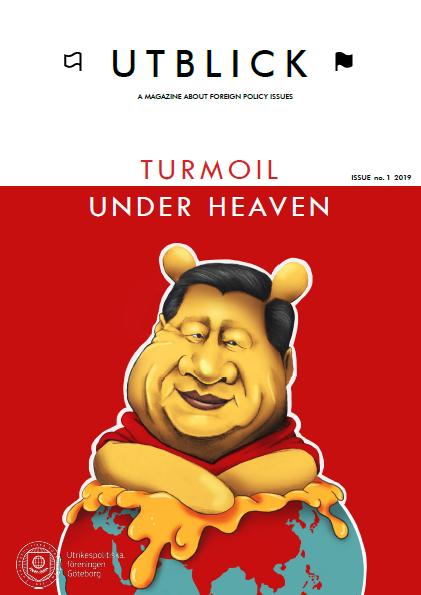 Will China be a benevolent Hegemon or a voracious predator? Will it preserve the current order, or will it change it in its own favor? Will it surpass and replace the United States as leader of the World, or will it be able to coexist peacefully? Will it be able to create enough goodwill among neighbors and forge a “community of common density” in the words of Xi Jinping, without being perceived as a revisionist threat to international order? Is there a real risk of a Great Power War breaking out between the US and China? All these questions, and more, are examined by our contributors in this issue.
Will China be a benevolent Hegemon or a voracious predator? Will it preserve the current order, or will it change it in its own favor? Will it surpass and replace the United States as leader of the World, or will it be able to coexist peacefully? Will it be able to create enough goodwill among neighbors and forge a “community of common density” in the words of Xi Jinping, without being perceived as a revisionist threat to international order? Is there a real risk of a Great Power War breaking out between the US and China? All these questions, and more, are examined by our contributors in this issue.
Utblick_nr 1/2019
Human Rights
The last issue of UTBLICK of this year has arrived!
We have covered human rights: the rights we have for simply being humans, supposedly inherent to all of us without discrimination. Something you would think would be “set in stone”, however, they have been growing and evolving since their conception. What’s more, their application is constantly on the line. Sadly, this makes it possible to talk about the multiple violations of human rights.
You will be able to learn more about some of the infringements, for example the refugee status and its links with the duty to rescue in the French case or the Australian government policy. We also discuss foreign domestic workers, their fragile citizenship and the abuses they are subjected to, such as inhumane working hours.
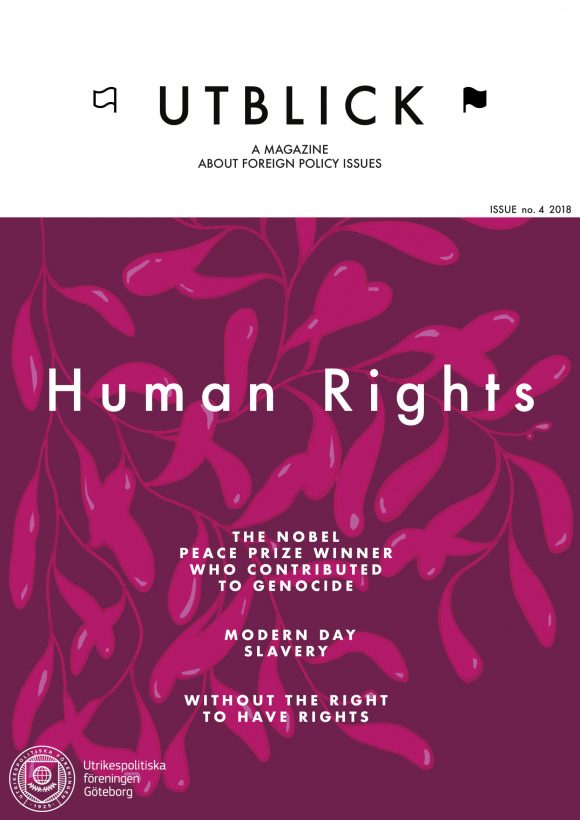 You can read about violations of the right to a fair trial and some creative outcomes of it; the dubious status of disabled people as bearers of rights around the world and the treatment of homeless people in the UK. Also,the extents to which nationalisation of giving birth and bearing life in China has gotten to, exemplified by the changing of its one-child policy.
You can read about violations of the right to a fair trial and some creative outcomes of it; the dubious status of disabled people as bearers of rights around the world and the treatment of homeless people in the UK. Also,the extents to which nationalisation of giving birth and bearing life in China has gotten to, exemplified by the changing of its one-child policy.
You will also be able to delve into reflections about the complex connection between the nation state and civil society; the relationship between human rights and climate change and an article about Aung San Suu Kyi and her status as a fallen human rights figure.
Lastly, and perfectly matching this season of the year, we have an interesting perspective on tradition and innovation, exemplified with the Dutch Sinterklaas and Black Pete.
UTBLICK no 4/2018
New Media
In this number we’ve talked about the broad subject of MEDIA.
For more than a decade the press freedom has declined in the world, but at the same time new kinds of media are on the rise.
Recent events have made us wonder about which changes media will go through in the near future. Since cases such as Snowden’s whistle-blow or Cambridge Analytica, how much do we know about how the data we provide and the data we receive is being handled? Furthermore, could the current state of a decentralized and extremely rapid flow of information have any consequences with practices like biohacking?
But we should not forget the people behind technology, and for instance, how the information is being moderated outside of algorithms; who are the people behind the reporting button?
This leads us to social media and how we interact with it; from the narcissistic use of social media t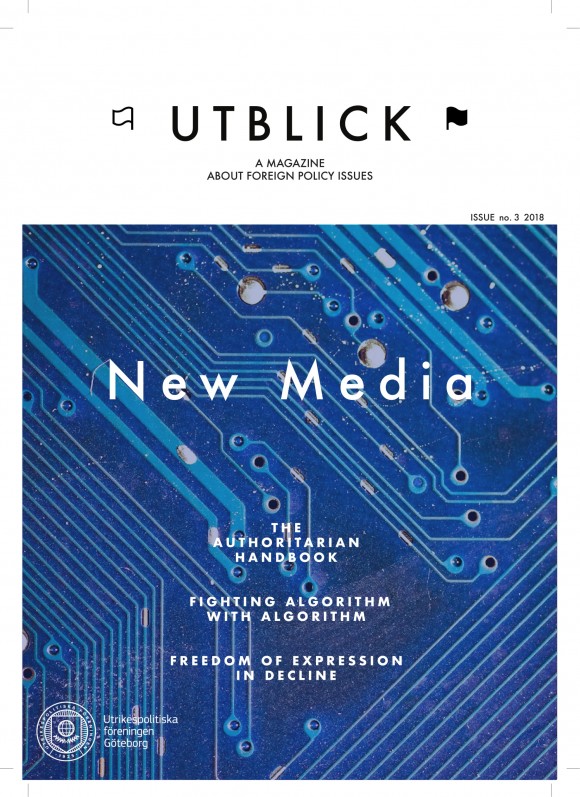 o the unconsented recording of Korea
o the unconsented recording of Korea
n women in public spaces. And also fake news, a term that has come up and been discussed all over during the last couple of years. But what exactly is fake news and how does it affect you? We hope you can find some answers with the specific case of Macedonia and how fake news managed to disband the country’s renaming referendum.
We also want to build your hopes up with a very inspiring inte
rview with Swedish news reporter Carina Bergfeldt and her thoughts on the journalistic career, the current politics and how has she managed to do some amazing things such as reporting the KKK from within.We should also be aware of the role of the more conventional media, by some cases such as Singapore and LGBT rights, performative violence and its treatment by the conventional media and lastly, Spain and its controversial freedom of expression. And on a bigger trend, the turn to illiberalism in democracies. So, to wrap it up, you will be able to find an “authoritarian handbook” :)
Utblick no 3/2018.
Elections and democracy in a changing world
This year we are facing an enormous amount of elections. One of the most important aspects of a democracy is elections, free and fair elections is what gives voice to our societies. So we thought it would be the right time to explore the concept of elections and a myriad of 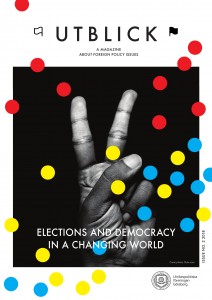 issues entailed to it, especially with the upcoming Swedish election that will be held in September. We wanted to look at elections in a wider spectrum and from different countries and cultures. So in this number of Utblick we hope you will learn about some of the elections which are taking place this year and some trends we are witnessing in the world right now. Such as the worrying lack of participation of the young generation in elections or the disconnect between society and politicians. This has brought to life alternatives like e-democracy initiatives such as DigidemLab.
issues entailed to it, especially with the upcoming Swedish election that will be held in September. We wanted to look at elections in a wider spectrum and from different countries and cultures. So in this number of Utblick we hope you will learn about some of the elections which are taking place this year and some trends we are witnessing in the world right now. Such as the worrying lack of participation of the young generation in elections or the disconnect between society and politicians. This has brought to life alternatives like e-democracy initiatives such as DigidemLab.
This is not to undermine national election issues, such as the coming mexican election, which is believed to shake the country’s policies. As well as the need to critically review parliamentary and presidency laws that might be discriminatory, such as the case of Bosnia and Herzegovina. Or democratic retreats, like in Cambodia.
Utblick no 2/2018
Feminism
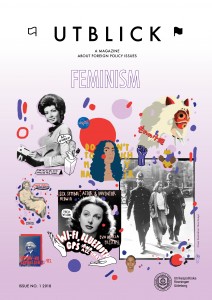 This issue has been carefully curated and edited by yours truly, Moa Persson and Ariadna Carrascosa, the new editors of UTBLICK magazine for this coming year 2018. We are very excited and glad to offer you this issue focused on feminism that we hope you enjoy as much as we did putting it out together!
This issue has been carefully curated and edited by yours truly, Moa Persson and Ariadna Carrascosa, the new editors of UTBLICK magazine for this coming year 2018. We are very excited and glad to offer you this issue focused on feminism that we hope you enjoy as much as we did putting it out together!
The idea is to match our first issue with the huge world event on the 8th of March, the International Women’s day. With this we wanted to explore the concept of feminism and a myriad of issues linked to it, while transmitting the idea that there is not a single feminism, but instead, there are many ways to be a feminist.
Utblick no 1/2018
Power
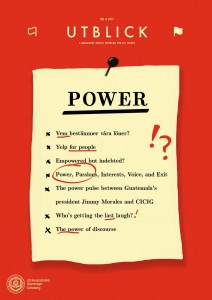 Power is a complex concept. What is power, who has it and what are the consequences of power being exploited? None of these questions can be immediately and easily answered; they require careful analysis and critical thinking on the ever-changing rules of power. In this last issue of 2017, we try to shed some light on these faces of power. Some of the covered aspects are the power of discourses, the role of money, and the authoritarian state mechanisms of disciplining the masses. These are however only scratches on the surface, yet we hope they give some insights and trigger some thought about the role of power in a modern society.
Power is a complex concept. What is power, who has it and what are the consequences of power being exploited? None of these questions can be immediately and easily answered; they require careful analysis and critical thinking on the ever-changing rules of power. In this last issue of 2017, we try to shed some light on these faces of power. Some of the covered aspects are the power of discourses, the role of money, and the authoritarian state mechanisms of disciplining the masses. These are however only scratches on the surface, yet we hope they give some insights and trigger some thought about the role of power in a modern society.
Utblick no 4/2017
[divide style=”2″]
Utopia/Dystopia
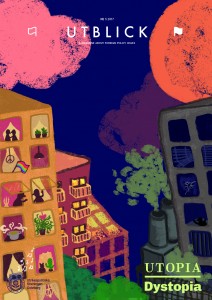 Dreams and nightmares of politics is no new thing. Used as a rhetoric tool, as means of analysis and subject of comparison, utopias and dystopias has from time to time been an influential ingredient of public debate. Carrying hope and dreams of a better future, utopias also come with the risk of oppression – if the ends justify the means, hope might quickly turn into despair.
Dreams and nightmares of politics is no new thing. Used as a rhetoric tool, as means of analysis and subject of comparison, utopias and dystopias has from time to time been an influential ingredient of public debate. Carrying hope and dreams of a better future, utopias also come with the risk of oppression – if the ends justify the means, hope might quickly turn into despair.
The third issue of Utblick 2017 examines these topics in greater detail. Covering subjects like (but not limited to) the state of contemporary politics, the role of social media, and the former colonial capital of Great Britain, we hope to provide some interesting reading for most of you.
Utblick no 3/2017
[divide style=”2″]
Capitalism at Play
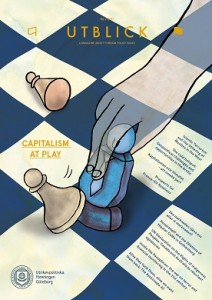 Time goes by and soon the spring semester will end. Dominated by the French elections, this spring has brought a lot of interesting matters of international policy. In this the second issue of Utblick 2017, we offer a mix of exciting topics, including but not limited to geopolitics in the Arctic, Islamic terrorism (and the practice of othering) and a few angles on capitalism.
Time goes by and soon the spring semester will end. Dominated by the French elections, this spring has brought a lot of interesting matters of international policy. In this the second issue of Utblick 2017, we offer a mix of exciting topics, including but not limited to geopolitics in the Arctic, Islamic terrorism (and the practice of othering) and a few angles on capitalism.
Utblick no 2/2017
[divide style=”2″]
International Machinery
With a politically turbulent winter behind us, there has been no 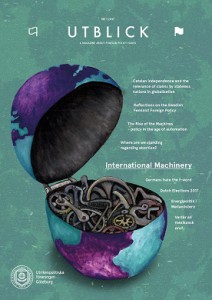 shortage of subjects to choose from when creating this first issue of Utblick 2017. Covering topics like the possible case of a Catalan state, the Dutch elections, automation in the global economy, and many more, we hope you will find some interesting reading in the International Machinery issue.
shortage of subjects to choose from when creating this first issue of Utblick 2017. Covering topics like the possible case of a Catalan state, the Dutch elections, automation in the global economy, and many more, we hope you will find some interesting reading in the International Machinery issue.
Utblick no 1/2017
[divide style=”2″]
(In)security
What is security? The field of Security Studies has various bids; some argue that it is a form of value that stands in proportion to an actor’s material well-being. Others claim that it is impossible to formulate a definition that satisfies every country, every culture, every people and every religion – in this view, security is a subjective concept defined by circumstances.
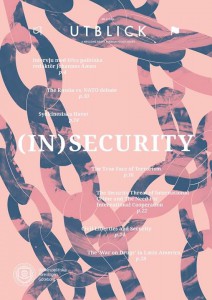 The matter is complicated even further when the topic is global security – different countries, cultures, peoples and religions have different ideas of what security is. While Americans may perceive US military presence in the Middle East as a reassurance of national security, the people living in that region may regard the very same thing as a cause of insecurity. In the same way, the individual goal of radicalization among Muslims may be to achieve individual social security. However, the result of that pursuit will inevitably endanger the security of others. Evidently, global security is an eternally multi-faced concept for which a single definition will never be enough.
The matter is complicated even further when the topic is global security – different countries, cultures, peoples and religions have different ideas of what security is. While Americans may perceive US military presence in the Middle East as a reassurance of national security, the people living in that region may regard the very same thing as a cause of insecurity. In the same way, the individual goal of radicalization among Muslims may be to achieve individual social security. However, the result of that pursuit will inevitably endanger the security of others. Evidently, global security is an eternally multi-faced concept for which a single definition will never be enough.
The final issue of the year deals with some of the issues on the contemporary global security agenda, with the goal of providing a detailed and enlightening view of the problems facing our world today, and with the objective of shedding light upon conflicts that have ended up outside the public spotlight.
Utblick no 4/2016
[divide style=”2″]
Exit
In the aftermath of Great Britain’s surprising decision to leave the European Union, there has been no shortage of speculations about the consequences that such a departure will have. Emerging Euro-sceptical forces throughout Europe have unanimously approved of the result of the referendum, and have attempted to reinforce anti-EU sentiment in their respective countries, calling for their own referenda. It remains unclear, however, if Brexit will ignite a trend that leads to the demise of the union, or if it instead marks the turn of that very same trend.
Peoples and 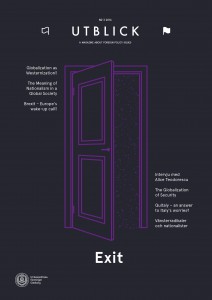 governments receding to the nation state is by no means exclusive for the European continent. It’s happening in every part of the world, and even if the different movements distinguish significantly from one another, there is at least one reoccurring critique – the denunciation of globalization. On the other side of the Atlantic, Donald Trump, Bernie Sanders, and even Hillary Clinton, have all taken a critical stance against both the Trans Pacific Partnership (TPP) and the Transatlantic Trade- and Investment Partnership (TTIP). In South America, market liberalization has been said to lead to exploitation of the continent’s underdevelopment, effectively cementing many countries in their current, underdeveloped state. In Asia, China has benefited greatly, and is currently breathing down the US’ neck as the world’s only superpower. And in the Middle East, Turkey is picking the raisins out of the globalization cake, utilizing the global market while attempting to steer clear of cultural change. Everything in the middle of the worst refugee crisis in decades, and an existential environmental crisis that requires intergovernmental cooperation more than anything.
governments receding to the nation state is by no means exclusive for the European continent. It’s happening in every part of the world, and even if the different movements distinguish significantly from one another, there is at least one reoccurring critique – the denunciation of globalization. On the other side of the Atlantic, Donald Trump, Bernie Sanders, and even Hillary Clinton, have all taken a critical stance against both the Trans Pacific Partnership (TPP) and the Transatlantic Trade- and Investment Partnership (TTIP). In South America, market liberalization has been said to lead to exploitation of the continent’s underdevelopment, effectively cementing many countries in their current, underdeveloped state. In Asia, China has benefited greatly, and is currently breathing down the US’ neck as the world’s only superpower. And in the Middle East, Turkey is picking the raisins out of the globalization cake, utilizing the global market while attempting to steer clear of cultural change. Everything in the middle of the worst refugee crisis in decades, and an existential environmental crisis that requires intergovernmental cooperation more than anything.
This issue of Utblick offers discussions on the future of the European Union, in depth analyses on specific countries, and debates, both on the origin and progression of different forms of criticism against globalization, and on the character and effects of the process itself.
Utblick no 3/2016
[divide style=”2″]
The Divided States of America
On November 8th this year, the United States will elect its 45th president. The two main parties, the Republicans and the Democrats, both seem to have decided on a nominee. Donald Trump, a billionaire businessman from Brooklyn, will stand as the republican candidate. His adversary will, with the greatest certainty, be Hillary Clinton, even if Bernie Sanders has vowed to keep fighting until the convention on July 25th.
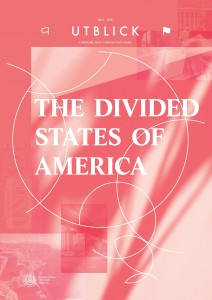 Compared to other years, this campaigning process stands out. Less than a year ago, Jeb Bush, the son and brother of the two former Bush presidents, was generally conceived to be the presumptive republican nominee. However, just like the rest of the establishment republicans, he got caught in a maelstrom of right wing populism, and was forced to drop out quite early.
Compared to other years, this campaigning process stands out. Less than a year ago, Jeb Bush, the son and brother of the two former Bush presidents, was generally conceived to be the presumptive republican nominee. However, just like the rest of the establishment republicans, he got caught in a maelstrom of right wing populism, and was forced to drop out quite early.
On the other side, Hillary Clinton lead the polls by enormous margins when the race started. While she’s still the candidate with the most votes, her lead has shrunk from insurmountable to minimal. Bernie Sanders, the man responsible for Hillary’s declining numbers, was ruled out for his socialist sympathies when he launched his campaign. He now holds sway over young voters, and dominates the internet in an impressive fashion.
But why is it that streams of populism, both to the left and right, have gained such strength? This issue of Utblick will attempt to pinpoint some of the reasons behind this election’s ideological irregularities, as well as offer candidate related debate and information about the US and its electoral system.
Utblick no 2/2016
[divide style=”2″]
Demo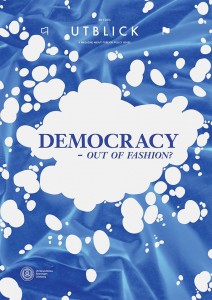 cracy – Out of Fashion?
cracy – Out of Fashion?
Democracy is often spoken of as the best form of governance that exists. While this may be true, democracy is by no means a flawless alternative. We’ve seen time and time again how democratic countries fall into ruin as a result of the people’s right to determine the form of state. The same people who are supposedly guided by egoistic incentives and discontent. It happened in Germany in the 1920s and 30s, then again in Serbia in the 1990s, and it’s happening again all across the democratic world. On the other hand, no constitution has ever proven as successful in so many instances as dem
ocracy has, begging the question ‘is there even a better alternative, or is democracy the best we’re ever going to have?
“Democracy – Out of Fashion?” offers a series of diverse analyses of countries where democracy is being challenged or is inefficient, as well as discussions regarding the very idea of what democracy is.
Utblick no 1/2016
[divide style=”2″]
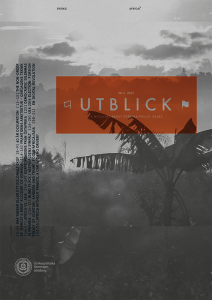 Africa?
Africa?
Africa, this big continent on the rise, is home to more than a
billion people in over 50 countries with diverse cultural and
political structures. Many African countries today are said to be at the forefront of economic and social development, making the continent a potential challenger to the world order of today and tomorrow. But still, these glimpses of progress seem to cover a very small part of what media in general reports. In this last issue of 2015 we dwelve into the past and present of the continent. Join our discussion by reading our latest articles, essays and interviews, aiming to give an alternative point of view than the mainstream media!
Utblick no 4/2015
[divide style=”2″]
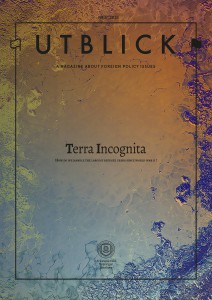 Terra Incognita
Terra Incognita
This issue of Utblick focuses on the current refugee crisis. The question is adressed through the lens of “Terra Incognita”, the unknown land. The articles gathered here discusses it from a psychological perspective and how standing face to face with “Terra Incognita” affects the search for the new or better, as well as discussing it from the perspective of the recipient countries: how it affects the mentality of the state and its citizens. Join our discussion by reading our latest articles, essays and interviews, aiming to give an alternative point of view than the mainstream media!
Utblick no 3/2015
[divide style=”2″]
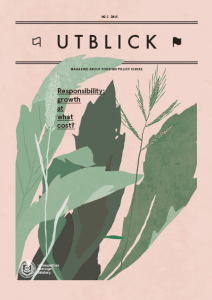 Responsibility / Growth
Responsibility / Growth
This issue of Utblick focuses on global growth, by addressing problems of responsibility and growth in relation to morality and economy (both on a local and global level). Topics we discuss include trade agreements, urban development, corporate responsibility, and even air pollution, medical resources and overfishing. Join our discussion by reading our latest articles, interviews and poems!
Utblick no 2/2015
[divide style=”2″]
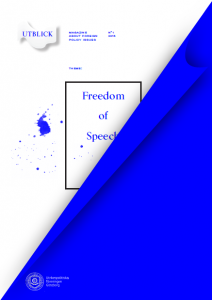 Freedom of Speech
Freedom of Speech
Utblick no 1/2015
This issue of Utblick tackles freedom of speech through articles ranging from the Charlie Hebdo massacre’s effects on French society to London’s public transport strikes and a reflection on traditional journalism’s challenges in the 21st century. Throughout the magazine, you can find poetry that we hope will add a personal interpretation to these complex discussions on freedom, censorship and the right to speak your mind.
[divide style=”2″]
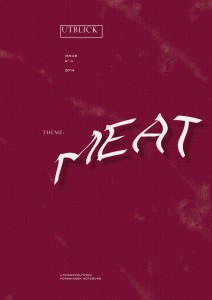 Meat
Meat
Utblick no 4/2014
[divide style=”2″]
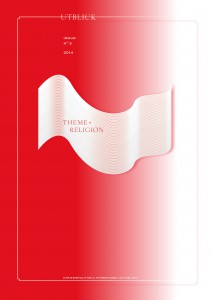
Religion
In the latest issue of Utblick: Read about the role of religion in international politics, as well as locally, here in Gothenburg! Our new designer Julia brings forth the new look Utblick, stuffed with illustrations and photographs, as well as discussions of religion in different contemporary political contexts. Enjoy!
[divide style=”2″]
Pro-choice
Utblick no 2/2014
In this issue of Utblick: Read about the American pro-life movement, the EU scepticism amidst the upcoming election, and find out why more and more people support Front National in France. Furthermore, you’ll be thoroughly briefed on the right wing populism of Turkey’s PM Erdo?an and his AK party, the issue of cannabis legalisation and much much more.
[divide style=”2″]
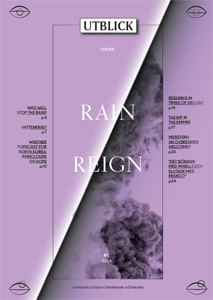 Purple Rain
Purple Rain
Utblick no 1/2014
This issue of Utblick offers reports on issues ranging from weather, rain and reign, as well as non-reign. Electronic rain over the DPRK, Musevenis Ugandan reign, water shortage in Israel and Palestine, disastrous rain, as well as the partial abscense of reign in Catalonia.
[divide style=”2″]
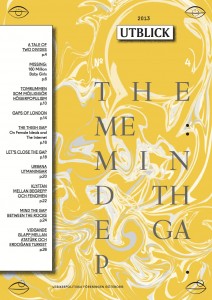 Mind the Gap
Mind the Gap
Utblick no 4/2013
The last issue of 2013 covers different types of gaps: gaps of power and within the political spectrum, gaps between sexes and within cities, as well as the literally palpable thigh gap. You could also read about how Erdogan’s Turkey widens the gap to Atatürk’s ideals, or about how widening gaps within nations relate to narrowing gaps between nations. Even more topics on the theme are waiting to be read, don’t miss it!
[toggle style=”closed” title=”Read Online”]
[/toggle]
[divide style=”2″]
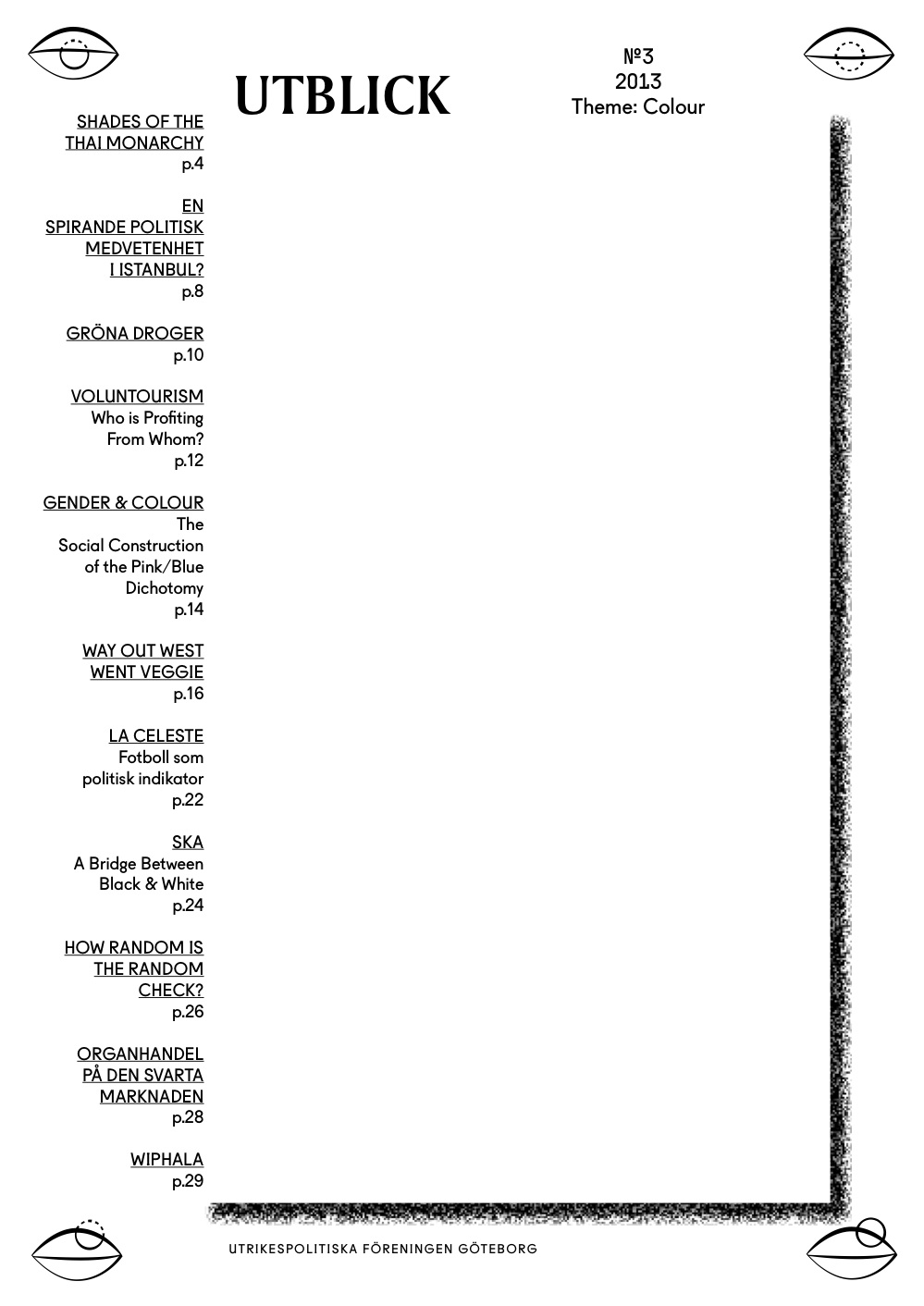 Colours
Colours
Utblick no 3/2013
The latest issue of Utblick emanates from the significance of colours. Colours are assigned different meanings over time and place, and are often a powerful symbol in its simplicity. The different colours of Wiphala, an ancient flag from the Andes, used to represent cultural heritage but is upcoming as a symbol for resistance. In Thailand, every weekday is assigned a colour. Here, the king has a peculiar trendsetting role: as he was born on a yellow Monday, the public is generally seen wearing yellow clothing on Mondays to manifest their royal support. In Gothenburg, Way out West festival took the “green” stance to stop selling any meat, stirring up controversy, whereas the ecological outlook is rather dim when it comes to pharmaceutical industries. Read about these issues and much more in this year’s third issue of Utblick.
[toggle style=”closed” title=”Read Online”]
[/toggle]
[divide style=”2″]
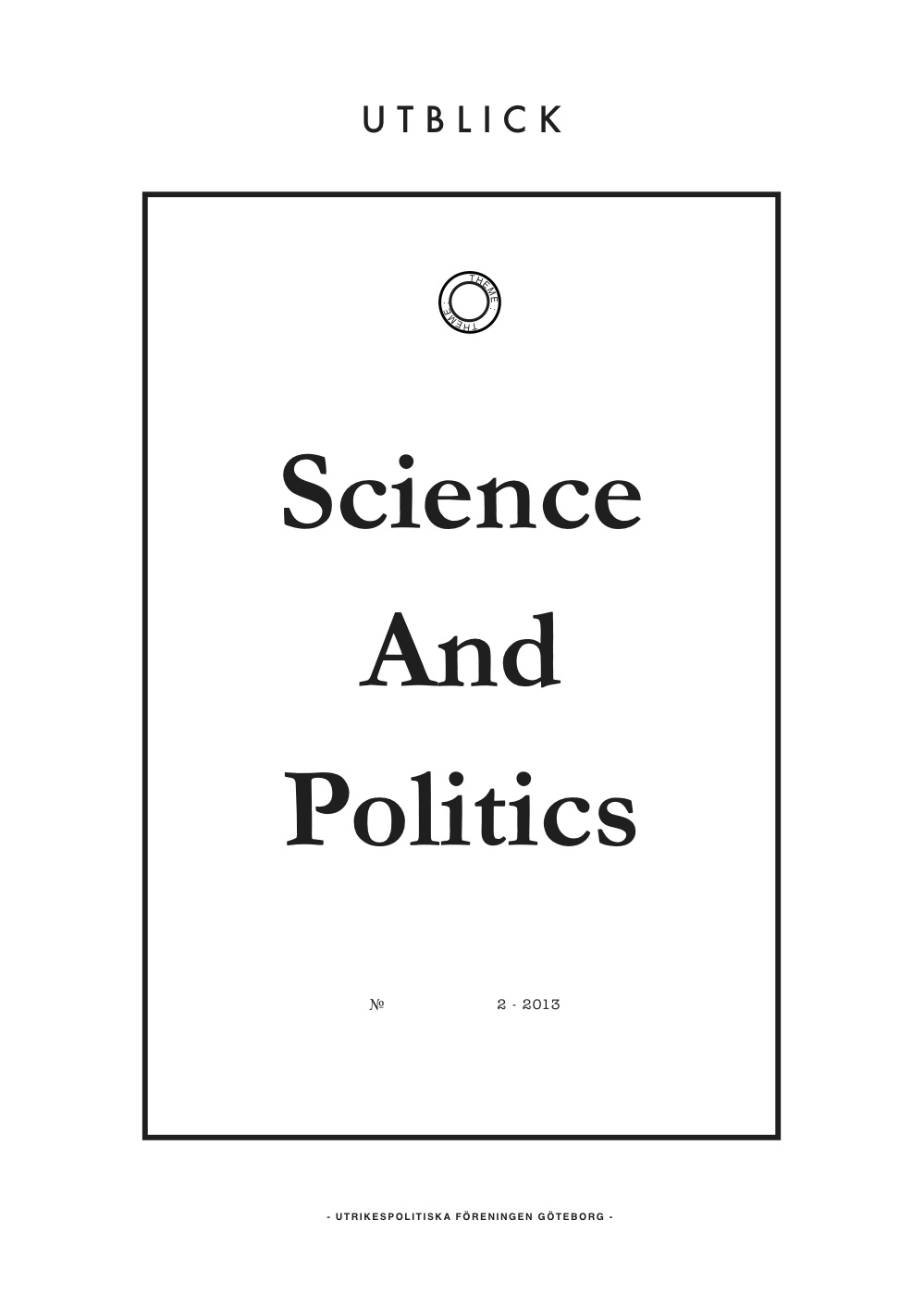 Science and Politics
Science and Politics
Utblick no 2/2013
This issue of Utblick investigates the interplay between science and politics. In China, industrial development has generated severe air pollutions, putting the regime in a political dilemma of how prioritise between economical development and environmental and health concerns. A political decision with local implications in Gothenburg has recently been made at EU level, granting the huge sum of €54 million to promote research regarding the new material grafen. Technological breakthroughs that enable new ways to extract oil can have huge geopolitical consequences, while 3D printers might democratise the means of production. In this issue of Utblick topics like these are explored from different angles, and it will hopefully give you some new insights in the world of science, and politics. Enjoy reading!
[toggle style=”closed” title=”Read Online”]
[/toggle]
[divide style=”2″]
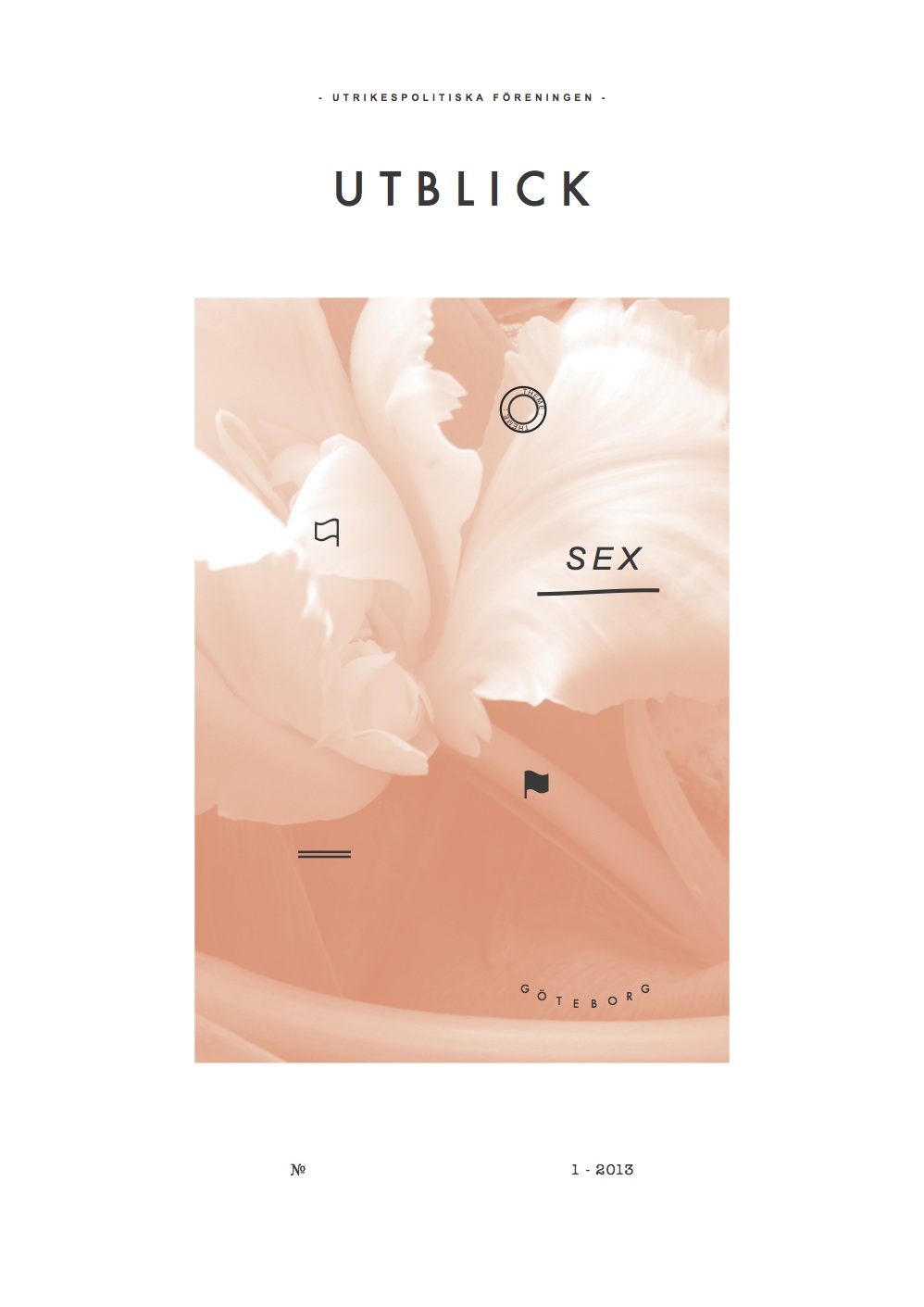 Sex
Sex
Utblick no 1/2013
The first issue of Utblick of the year investigates different aspects of the relation between sex and international politics, featuring articles on trafficing, gay rights, sex tourism, ecological sex toys, gender, norms and much more. Meet the acclaimed documentary filmmaker Nahid Persson Sarvestani in an interview where she talks about her struggle for womens rights in Iran, read an analysis on how the horrifying rape case in India could possibly lead to much needed reforms, learn about how legalization of weed has been proposed as an instrument to curb sexual drive. In short, this issue is stuffed with interesting texts, and you shouldn’t miss it!
[toggle style=”closed” title=”Read Online”]
[issuu layout=http%3A%2F%2Fskin.issuu.com%2Fv%2Flight%2Flayout.xml showflipbtn=true documentid=130324172039-fc48aff7436f40c4af3ad8563ae10982 docname=utblick_2013_no1 username=utblick loadinginfotext=Sex showhtmllink=true tag=politics width=420 height=297 unit=px]
[/toggle]
[divide style=”2″]
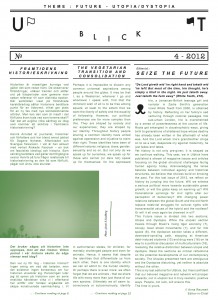 Future
Future
Utblick no 4/2012
Utblick’s last issue for the year is looking into the future. Depending on from which end you start to read it, you will get either a utopian or dystopian angle on different subjects, such as the vegetarianism and the meat production, the war on drugs, prospects of space tourism and Brazil’s role as a regional power. You can also read interviews with possible employers, politicians and a historian’s view on what we can learn from history. And much more, all delivered in a lovely retro look! Don’t miss it!
[toggle style=”closed” title=”Read Online”]
[issuu width=420 height=288 backgroundColor=%23222222 documentId=121203164115-62f990d41959480c99145a17058d01b2 name=utblick_2012_nr_4 username=utblick tag=dystopia unit=px v=2]
[/toggle]
[divide style=”2″]
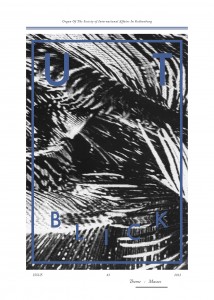 Masses
Masses
Utblick no 3/2012
Utblick’s first issue this autumn has a brand new design! The theme is Masses, and the magazine includes articles spanning from the role of social media in collective action and oil in Iraq, to weavers in India and dilmemmas with development goals, as well as interviews and recommendations from the Editoral staff. Read it!
[toggle style=”closed” title=”Read Online”][issuu width=420 height=294 backgroundColor=%23222222 documentId=121024140149-dd59afd22bf74d77b21f52d3f0b8d36b name=utlick_3_red2 username=utblick tag=magazine unit=px v=2]
[/toggle]
[divide style=”2″]
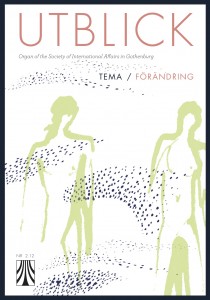 Förändring
Förändring
Utblick nr 2/2012
Årets andra nummer handlar om “Förändring”, med en tillbakablick på den Arabiska våren såhär ett år senare. I Egypten leder den politiska omdaningen till att kvinnors situation förändras, i Ecuador risker regnskogarna att få vika sig för efterfrågan på den olja de härbergerar, och på nätet sprids kampanjer som “Kony 2012” om en förändrad världsordning genom sociala medier. Motstånd mot utbildningens likriktning, samtal med människorättsaktivister angående Palestina, möjligheterna till förändring genom årets parlaments- och presidentval och inte minst ett Quiz om vad som komma skall är ytterligare några av numrets många godbitar. Läs!
[toggle style=”closed” title=”Read Online”][issuu viewMode=singlePage width=300 height=427 backgroundColor=%23222222 documentId=121001212417-9bab5e2e84734a1db5652207b69edf40 name=utblick_nr_2_vt_2012 username=utblick tag=change unit=px v=2]
[/toggle]
[divide style=”2″]
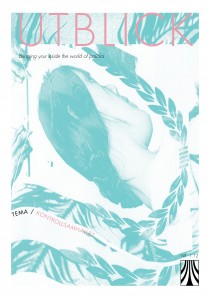 Kontrollsamhället
Kontrollsamhället
Utblick nr 1/2012
Årets första nummer är nu ute! Temat är “Kontrollsamhället”, och här kan du bland annat läsa om auktoritetens illusionsskapande i Nordkorea, förtryck i Iran, bekämpandet av de indiska naxaliterna och de ökade möjligheterna till övervakning i takt med mobiltelefonernas närapå universella genomslag. Läs den!
[toggle style=”closed” title=”Read Online”][issuu viewMode=singlePage width=300 height=427 backgroundColor=%23222222 documentId=121005164445-4239d346aa8e4005ba2017b2dcd50647 name=utblick_nr_1_vt_2012 username=utblick tag=utblick unit=px v=2]
[/toggle]
[divide style=”2″]
Makt
Utblick nr 4/2011
[divide style=”2″]
Pengar
Utblick nr 3/2011
Teknologiskt paradigmskifte
Utblick nr 2/2011
[divide style=”2″]
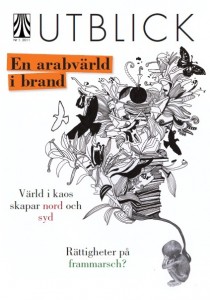 Utmaningar för global utveckling
Utmaningar för global utveckling
Utblick nr 1/2011
Vårens första nummer av Utblick har det relativt ambitiösa temat: ”utmaningar för global utveckling, med fokus på konflikthantering, fattigdomsbekämpning och mänskliga rättigheter i syd: kulturella och religiösa utmaningar”. Temat lyfter omedelbart frågorna –vad inbegrips i begreppet ”syd”, är bistånd ett bra tillvägagångssätt för att bekämpa fattigdom och kanske framförallt: hur kan ”opinionsbildning kring globala frågor” rättfärdigas?
[divide style=”2″]
 Hög tid för eftertanke
Hög tid för eftertanke
Utblick nr 4/2010
Julen är konsumtionens högtid och anklagas ofta för att vara en köpfest kidnappad av multinationella företag. Julen symboliserar mer än överdimensionerade berg av julklappar, delade meningar kring lutfisk och sockermarinerade tänder. Ur ett Utrikespolitiskt perspektiv – vad betyder det att många människor handlar enorma mängder julklappar med insikten att personen som ska få paketet förmodligen inte kommer att uppskatta gåvan?
[divide style=”2″]
Hur ser vår framtid ut?
Utblick nr 3/2010
En framtidsvision över det kommande decenniet:
Följ med oss i vår lekfulla ansats till att begrunda tänkbara framtidsscenarier! Numret omfatta texter om allt från smärtan i att inte hänga med, de asketiska buddistkvinnorna mai chii och morgondagens attityder.

